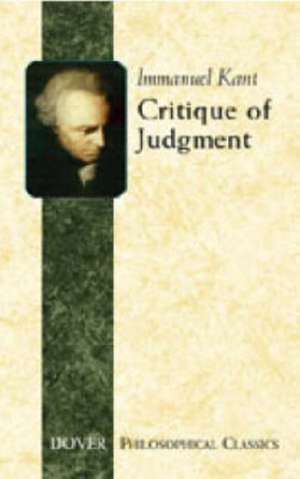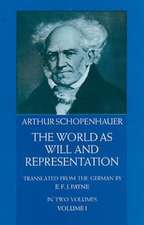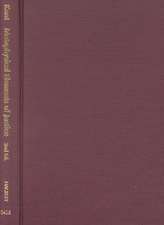Critique of Judgment: Dover Philosophical Classics
Autor Immanuel Kant Traducere de J. H. Bernarden Limba Engleză Paperback – 31 aug 2005
As in his previous critiques, Kant seeks to establish "a priori "principles. The first part of this work addresses aesthetic sensibility. The human response to specific natural phenomena as beautiful, he asserts, is a recognition of nature's harmonious order that corresponds to a mental need for order. The critique's second half focuses on the apparent teleology in nature's design of organisms. The philosopher declares that the mind is predisposed to find purpose and order in nature, and this predisposition forms the main principle underlying all our judgments. Although this could be interpreted as an argument in favor of a creator, Kant insists that a supernatural dimension or the existence of God cannot be proven such considerations lie beyond the realm of reason, solely within the province of faith."
| Toate formatele și edițiile | Preț | Express |
|---|---|---|
| Paperback (4) | 58.98 lei 3-5 săpt. | |
| Dover Publications – 31 aug 2005 | 58.98 lei 3-5 săpt. | |
| Hackett Publishing Company – 31 mar 1987 | 192.68 lei 3-5 săpt. | +59.14 lei 10-14 zile |
| Digireads.com – 18 dec 2019 | 97.60 lei 6-8 săpt. | |
| COSIMO CLASSICS – 31 mai 2007 | 139.31 lei 6-8 săpt. | |
| Hardback (1) | 441.56 lei 3-5 săpt. | |
| Hackett Publishing Company, In – 31 mar 1987 | 441.56 lei 3-5 săpt. |
Preț: 58.98 lei
Nou
Puncte Express: 88
Preț estimativ în valută:
11.29€ • 11.71$ • 9.43£
11.29€ • 11.71$ • 9.43£
Carte disponibilă
Livrare economică 22 februarie-08 martie
Preluare comenzi: 021 569.72.76
Specificații
ISBN-13: 9780486445434
ISBN-10: 0486445437
Pagini: 253
Dimensiuni: 117 x 224 x 14 mm
Greutate: 0.26 kg
Editura: Dover Publications
Seria Dover Philosophical Classics
Locul publicării:United States
ISBN-10: 0486445437
Pagini: 253
Dimensiuni: 117 x 224 x 14 mm
Greutate: 0.26 kg
Editura: Dover Publications
Seria Dover Philosophical Classics
Locul publicării:United States
Recenzii
Pluhar maintains a fine, even tone throughout. . . . Those who have found the prospect of teaching the third Critique daunting will admire its clarity. . . . No one will be disappointed. --Timothy Sean Quinn, The Review of Metaphysics


































